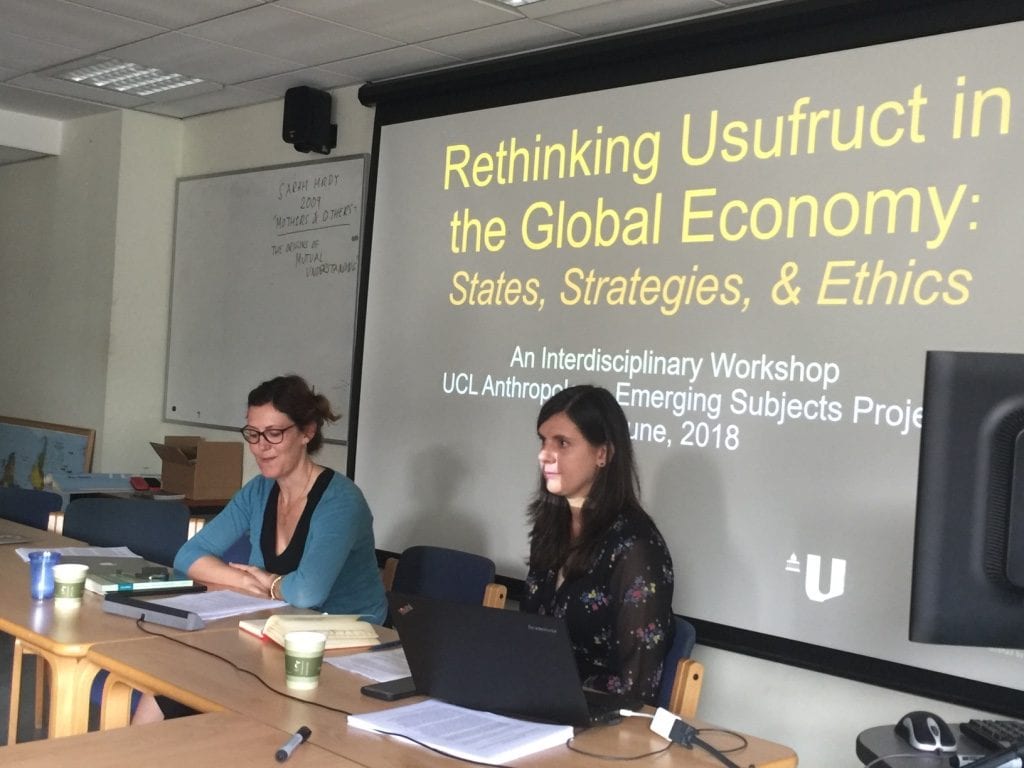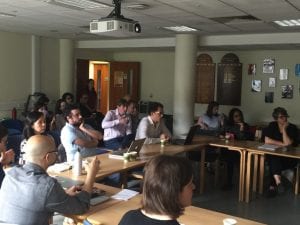New Forms of Ownership and Possession in the Global Economy
By ucsaar0, on 4 July 2018
How do people access things that allow them to ‘live well’? Through what means and by brokerage with which agents are they able to do so? What does it mean for something to ‘bear fruit’, and what is the difference between ‘use’ and ‘possession’?
These are some of the questions that were posed by a group of international scholars gathered at UCL Anthropology on the 11th June.[1] Drawing inspiration from our non-Roman legal heritage, we sought ways to describe new relations of ownership in the global economy through the idea of usufruct.
Different from the sharing economy, or forms of ‘commoning’, usufruct denotes a legal relationship of temporary possession. It points to a thing (a res) which someone may be granted temporary access to, while it remains owned by someone else. What grows (can be reaped, derived, enjoyed or yield interest) out of such temporary access may be held in possession by the custodian, i.e. you can possess water from a well (use), but the state retains ownership over the well and the land on which it is placed (possession).[2]
While interest in this form of ownership emerged out of our research in Mongolia (here and here), we set the somewhat playful task of ‘thinking with usufruct’ as a provocative starting point or ‘theory machine’ (Helmreich’s 2011), to explore features of global capitalism and to understand new forms of ownership.
Each of the speakers presented work concerned with different kinds of possession and usage (res nilus, res extra-market, res commons, etc.). As environmental, political and economic landscapes have changed, new kinds of property and ownership regimes have emerged around the world. But rather than think of this as something forced upon people (due to neoliberal conditions of precarity or the effects of environmental change), we also explored the way in which recourse to this mode of ownership was the outcome of deliberate strategy-making that created difference and variation amid economies of ownership that were imposed. Temporary possession, we found, both sustains forms of contemporary capitalism (one that is more financialized, with a greater blurring of private-public domains than the privatisation characteristic of 1990s/2000s neoliberal capitalism), and challenges it from within.
The day was arranged around three panels. In session 1, States of Usufruct, Andrea Muehlebach (Anthropology, University of Toronto) presented work on the Italian anti-privatization water movement in the early 2000s and the different views of possession among lawyers versus local activists through the symbol of the water fountain. Hanne Petersen (Legal Cultures, University of Copenhagen) showed how recourse to earlier ideas and concepts (including inter-species marriage) allows us to begin to piece together a framework for renewal of the modern legal worldview, components of which are shifting on all levels. Seth Schindler (Geography/Global Development, University of Manchester) presented material on new transnational territories emerging in response to governance failure and market fluctuations. Here territory is plunged into global market chains without clear sovereign control. In such context, the management of waste and water becomes disrupted and new forms of ownership and use emerge. Nicola Triscott (Art, Science & Technology, Arts Catalyst / University of Westminster) talked about her curatorial work linking people, processes and environmental activism in the UK and the Arctic with geopolitical politics forcing people into states of usufruct.
In the second panel, Strategies of Usufruct, Luiz Costa (Anthropology, Federal University of Rio de Janeiro) spoke about usufructuary custodianship as a strategy used by the Kanamari in Amazonia allowing for innovative human-animal relations as they look after white men’s cattle, in return for which they receive various goods. Here usufruct conceals relations of mistrust, allowing people to raise animals that they don’t eat and allowing the whites to eat animals that they do not raise. Laura Rival (Anthropology/International Development, University of Oxford) spoke about a North American environmental services company called Ecogenisis that set up rights of usufruct through a legal agreement with the Huaorani in Ecuador to implement a portfolio of businesses into the region, thereby ‘weaning them off’ oil. However, the agreement was deemed illegal under the Supreme Court who claimed sovereignty over ethnic territory as the Huaorani didn’t want an exclusive relationship with Exogeisis.
Padini Nirmal (Geography, Clark University) talked about her work from Kerala, in India, where Adivasi peoples are owned by land as much as the land owns them. Losing or being displaced from their land causes a disembodiment that points to alternative genealogies of ownership which mark land as property. Possession and dispossession are categories that need to be rethought in such light. Finally, Christopher Harker (Institute for Global Prosperity, UCL) spoke about his work among families in Ramallah, Palestine. Here, colonial forms of usufruct force things (land) which had previously been held in permanent ownership to become temporary. In contrast, new forms of debt and financial organisation allow for forms of temporary possession that open up futures and enable home ownership without land ownership. This panel highlighted ways in which usufruct can become a means by which to dominate or liberate people from forms of power and control. It also drew attention to the prevalence of public / private partnerships blurring models of ownership and the state.
In the final panel, Ethics of Usufruct, Antonia Walford (Anthropology, UCL) spoke about the generation of environmental scientific data in the Amazon. Here the ownership of data is highly contested, creating insiders and outsiders. She focused on the ‘cleaning’ of data and the lack of ownership over it by the people who do it. Instead these people hold partial possession over data but not the means to use it or transform it. Alberto Corsin-Jimenez (Anthropology, Spanish National Research Council) presented material on the Free Culture Movement in Madrid, Spain, with a focus on the Assembly that is formed to access communal spaces as property. Usufruct here appears as civic use. He highlighted in particular the idea of the right to the city, to inhabit and access its joy and the need to recognise this as a feature of free / new social forms that are emerging. Lastly, Peg Rawes (Architecture and Philosophy, UCL) presented her work on Spinozian ethics, ideas which underpin the Alms house in Amsterdam as a form of social housing. She reflected these ideas back onto architectural practices that make spaces which they see as reflective of such ideals and she questioned the moral codes that underpin this.
Using usufruct as a starting point by which to think through such diverse material allowed us to make comparisons across different spheres that we wouldn’t normally think of as connected. We also let go of the need to refer back to (or hold in place) that initial point of comparison and instead allowed it to open up a space by which to illuminate difference.
In an age when recourse to the ‘global’ (as in global economy) often serves to mask things as universal and inevitable, making such difference visible in economies of ownership that initially appear to be the same becomes an inherently political act. It is to show the diverse ways of owning, possessing and using which flourishes and exists within capitalism. Using usufruct, with its heritage in Roman law, as a means by which to identify this variation seems an appropriate means by which to begin to do so.
The day ended with a sense that rethinking usufruct was indeed highly exciting and presented an experimental way of thinking about present day conditions. We ended with a drinks reception in the Department and a vegetarian Indian meal. Sharing such fruits with our friends and colleagues, some whom joined us from great distances, was a wonderful occasion and one that will sow the seeds for the growth of future collaborative articulations in press.
[1] The workshop was organized by Lauren Bonilla and Rebecca Empson, with support from the members of the Emerging Subjects project and Paul Carter-Bowman at UCL.
[2] (Usufruct (n.): “Right to the use and profits of the property of another without damaging it,” 1610s (implied in usufructary), from Late Latin usufructus “use and enjoyment,” from Latin usus “a use” (see use (n.)) + fructus enjoyment,” also “fruit” (from Pro-Indo-European root *bhrug- “to enjoy,” with derivatives referring to agricultural products). Attested earlier in delatinized form usufruit (late 15c.).
63 Responses to “New Forms of Ownership and Possession in the Global Economy”
- 1
-
2
markphillips wrote on 15 June 2023:
Ownership reviews also consists of a complex web of many rights all of which are rights in rem, and not merely rights against persons.Ownership is actually the sum total of the rights of possession.
-
3
Susen Michel wrote on 19 June 2023:
The Ownership also consstes of done complex website of many rights or which are rights in rem it’s not merely against persons. https://www.mybkexperience.onl/ the ownership is sum total of possession.
- 4
-
5
Kelly wrote on 23 June 2023:
Great article, lots of great content to be shared. Thank you very much. wordle hint
-
6
Bushra wrote on 25 June 2023:
This is such a great resource that you are providing and you give it away for free. calgary maternity photographer
-
7
Ronnie Lynch wrote on 27 June 2023:
Hello, I read this nice article. I think You put a best effort to write this perfect article. I appreciate your work. thank you so much.
free games -
8
Assignment Help Online wrote on 29 June 2023:
Experience the difference with the best dissertation writing services UK. Skilled writers, personalized approach, and impeccable dissertations.
-
9
Essay Writing Help wrote on 29 June 2023:
In addition to saving time and reducing stress levels, seeking Essay Writing Help allows students to gain valuable insights from experts in the field. These professionals possess extensive experience in academic writing and can provide guidance on effective research techniques, proper citation formats, and overall improvement of writing skills.
-
10
Assignment Help Online wrote on 29 June 2023:
Essay Writing Help plays a crucial role in supporting students throughout their academic journey. By availing these services, students can receive expert guidance while producing high-quality essays that showcase their knowledge and understanding of the subject matter.
- 11
- 12
-
13
Emilio Patterson wrote on 11 July 2023:
I’m a language student so these concepts are quite abstract for me. My bad ice cream friends understand it quite well.
 Close
Close









Nice free blog comment. Great article. HMFusa